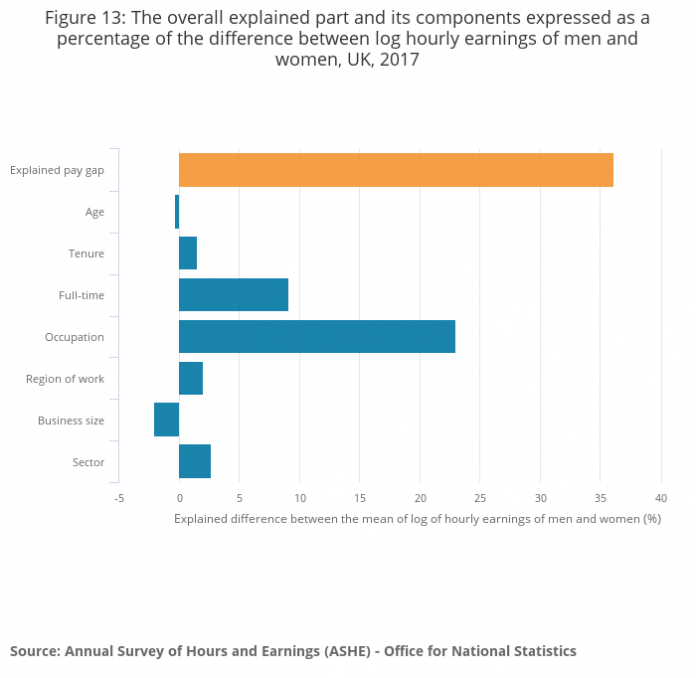Around two thirds of the UK gender pay gap cannot be attributed to differences, such as more women working part time, according to new analysis by the Office for National Statistics.
The ONS analysis took into account factors that influence pay. These include age, type of occupation, how senior the role is and how long an individual has worked for a company.
It found that 36.1% of the gender pay gap could be explained by differences in characteristics included in its model – with occupation having the largest effect (it explained 23% of the differences between men and women’s hourly pay).
The remaining 63.9 per cent was not as easily explained. Factors that weren’t considered – though which were likely to have an impact, says the ONS – include career breaks to look after children, women’s caring responsibilities and academic qualifications.
However, it says that it is ‘possible’ that discriminatory behaviour plays a part in the unexplained gap.
Quick figures:
- The gender pay gap for full-time workers is entirely in favour of men for all occupations.
- Between 2011 and 2017, men’s pay has grown by 10.4% from £13.12 to £14.48 per hour while women’s pay has grown by 12.0% from £11.75 to £13.16 per hour, says the ONS.
- This means that in 2017, men on average, were paid £1.32 more per hour than women, which, as a proportion of men’s pay, is a pay gap of 9.1%.
- Overall, women’s pay grows less than men’s and also stops growing earlier than men’s pay.
Full time, higher paid occupations
The ONS research says that in 2017, men and women working full-time in the highest-paid occupation group (chief executives and senior officials) earned a median hourly pay of £48.53 and £36.54 respectively.
The figures show that men have 72.8% of the full-time employment share in the highest paid occupation group (chief executives and senior officials). Men also had 70.2% of the full-time employment in the second-highest-paid occupation group (managers and directors) and had a median hourly pay of £23.69, which was £2.62 higher than the median hourly pay for women.
Different occupations
Pay also varies across different sectors. For example, the gender pay gap is largest in the skilled trade occupations group at 24.8% and smallest in sales and customer service occupations at 3.6%. The ONS points out that where the pay gap is largest (skilled trade occupations), men have the highest full-time employment share at 92.0% and where it is smallest (sales and customer service occupations), the full-time employment shares are almost equal with 50.1% men and 49.9% women. The respective hourly pay in that occupation is £9.62 for men and £9.27 for women.
Age
While younger men (age 16 to 21) are split more equally between those who work fulltime and those who work part time, by the time men are between 30 and 39, 91% of men’s jobs are full time. The ONS found that from the age 40 onwards the gap widens reaching its peak between ages 50 to 59. Women however, are less likely to work full-time, with only 61.1% and 57.6% of women’s jobs being full-time for ages 30 to 39 and 40 to 49 respectively. The increased gap in pay for older women may capture the differential impact of taking time out of the labour market.
The ONS says that one possible reason for taking time out is having children. Pointing to labour market figures, it says that between April and June 2017, the employment rate for women with dependent children was 73.7% with 51.8% of the jobs being part-time whilst the employment rate for men with dependent children is 92.4% with 90.1% of these jobs being full-time.
Length of service
The ONS also investigated the effect tenure had on men’s and women’s median hourly pay. Even here it found a pay gap between men and women. It says that men and women in full-time employment and working for more than 20 years in the same job earned 59.6% and 48.4% more respectively than men and women who had been in their job for less than one year.


